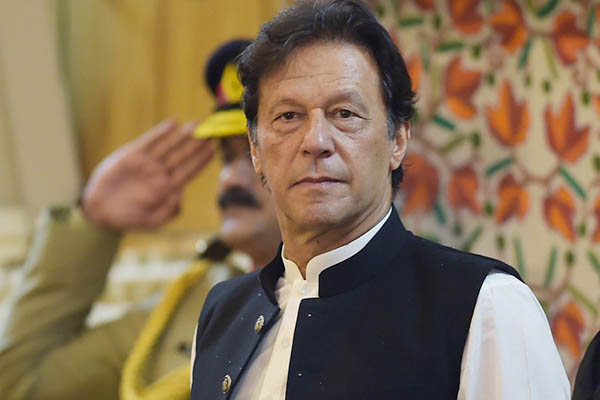
File photo of Prime Minister Imran Khan. Aamir Qureshi—AFP
Apex court directs premier to submit, within 4 weeks, report identifying actions taken to resolve complaints of parents of APS massacre victims
Prime Minister Imran Khan appeared before the Supreme Court of Pakistan on Wednesday, declaring that there are “no sacred cows” in the country and he is willing to take action against any culprits in pursuit of the rule of law.
A three-judge bench headed by Chief Justice Gulzar Ahmed summoned the prime minister to appear before it in a suo motu case pertaining to the 2014 Army Public School massacre in Peshawar that was claimed by the Tehreek-e-Taliban Pakistan, whose militants killed nearly 150 people, mostly schoolchildren. In their plea, parents of the victims had demanded that a transparent probe be conducted into the incident and authorities responsible for the intelligence failure be prosecuted.
During proceedings, Justice Ijazul Ahsan told Khan it was important to satisfy parents who had lost their children to such a barbaric act. “The parents demand that the leadership of the time be prosecuted,” he said. In response, Khan acknowledged that his party had been in power in Khyber-Pakhtunkhwa at the time of the tragedy, adding that he had met the parents immediately after the attack. “We provided them compensation. There wasn’t much more that we could do,” he said.
To this, the chief justice said that the parents weren’t seeking compensation; they wanted to know why the country’s security forces had failed to protect their children. To this, Khan claimed that the country’s civilian and security leadership had formulated the National Action Plan and defeated militancy in the country. “[The court should] find out why 80,000 people were killed,” he said. “Also find out who is responsible for 480 drone attacks taking place in Pakistan,” he added.
“Finding out about these things is your job; you are the prime minister,” the chief justice responded. “As the prime minister, you should have the answer to these questions,” he added.
When Khan advised the court to constitute a high-level commission on the APS tragedy, the chief justice said it had already been formed and issued a report. “Did you not read it?” he said, adding that the apex court’s Oct. 20 order had clearly stated that the government should find out who was responsible for the massacre and take action against them.
Justice Qazi Muhammad Amin Ahmed, meanwhile, asked the premier about the government’s announced plans to negotiate peace with the TTP. “You have brought the culprits to the negotiating table. Are we once again about to sign a surrender document?” he said.
Khan assured the court that the government would ensure that justice was delivered. The judges then directed the government to ensure implementation of its Oct. 20 verdict and submit a report within four weeks.
Abrupt summons
Earlier, the court had sought an update on the Oct. 20 order from the attorney general. In his response, he claimed FIRs could not be filed against the senior military officials that had been implicated by the parents. The order had noted that the parents wanted cases registered against then-Army chief Gen. Raheel Sharif, then-interior minister Chaudhry Nisar Ali Khan, then-Khyber-Pakhtunkhwa chief minister Pervez Khattak, then-Peshawar Corps Commander Hidayatur Rehman, then-DG ISI Lt. Gen. Zaheerul Islam, and then-secretary interior Islamabad Akhtar Ali Shah.
The court lashed out at the attorney general over his response, stressing that the incident had been a result of security lapse that authorities should have been aware of prior to the attack. “We have such a huge intelligence network, billions of rupees are spent on it. We also claim to be the best intelligence agency in the world,” the chief justice said.
When the attorney general sought time to seek directives from the prime minister and other officials so he could respond to the court, the bench decided to summon the prime minister and seek answers directly from him. The orders were issued around 9:30 a.m.; the prime minister reached court around 11:30 a.m.
Supremacy of law
In a press conference after the prime minister’s court appearance, Information Minister Chaudhry Fawad Hussain said Khan had once again respected the supremacy of law by appearing before the court. He claimed the government would finalize its report in four weeks and submit it to the Supreme Court. “We could have simply said the PMLN was in power at that time and accused then-P.M. Nawaz Sharif and the former interior minister of failure. But we realize this war is beyond individuals,” he claimed.
Describing the three years of PTI’s rule as the “most peaceful years of Pakistan’s history,” he said all security agencies should be credited for implementing the decisions of the country’s political leadership. He said intelligence failures happen “all over the world”, adding five bombers had lived in front of the White House in the U.S. unnoticed.
Similarly, Interior Minister Sheikh Rashid Ahmed told media the prime minister had assured the apex court of exposing everyone—“whether the interior minister or people of higher agencies”—found responsible for the APS attack.
